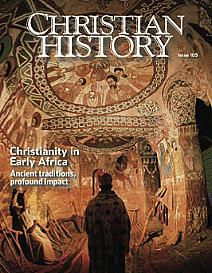People Cannot Save Themselves by Good Deeds Said African Bishops
THE TEACHINGS OF PELAGIUS alarmed the church of North Africa. Why? Pelagius rejected the church’s understanding of the Bible: that every human inherits Adam’s fallen nature. He also claimed there were sinless men before Christ, and taught that we can earn salvation by good works.
An African synod persuaded Pope Innocent I to condemn the teachings of Pelagius and his follower Celestius. However, Pope Zosimus reversed Innocent’s decision, saying the two heretics had been slandered. He rebuked the African church for falling for such slanders.
Alarmed, the church of North Africa wrote Zosimus an urgent letter, asking him to stick with Innocent’s ruling: “For every single good action we need the help of the grace of God through Jesus Christ; and this is not only to perceive what is right, but also to practice it, so that without it we can neither possess, think, speak, or do anything really good and holy.”
To add weight to their plea, they decided to meet in a local council, called a synod. On this day, 1 May 418, over two hundred bishops gathered in the Basilica of Faustus in Carthage. They represented the provinces of Byzacena (Tunisia), Tripolis (Libya), Numidia (Algeria/Tunisia), Mauritania Sitifensis (Morocco/Algeria), and Caesariensis (Algeria)—not to mention a few from Spain. Presiding over them was Bishop Aurelius of Carthage. Their deliberations prompted them to issue a number of rulings dealing with the implications of Pelagianism.
The first declared that Adam would have lived forever had he not sinned. The second insisted that Adam’s sinful nature is passed to all human children, necessitating their baptism. The synod also declared that we need Christ’s grace to live a holy life.
The synod was not concerned only with the issue of Pelagianism. It also dealt with the ongoing problem of the relationship between the mainstream church and the break-off Donatist group. One provision forbade priests, deacons, and other low-level clergy from appealing to Rome if they did not approve a ruling of their own bishop. They had to appeal to the North African hierarchy instead.
Some of these decisions were later used in arguments about infant baptism and the Bishop of Rome’s claim to jurisdiction over the entire church. But for the North African church, the most important immediate outcome was that Pope Zosimus reconsidered his earlier leniency toward the Pelagians and condemned their teaching.
—Dan Graves
------ ------- -------
[Christian History #105, Christianity in Early Africa captures something of Africa's theological contributions and faith battles early in the Christian era.]






